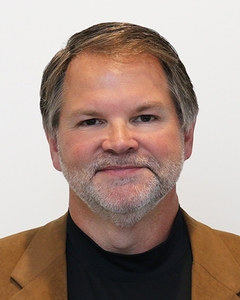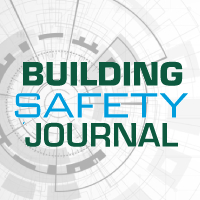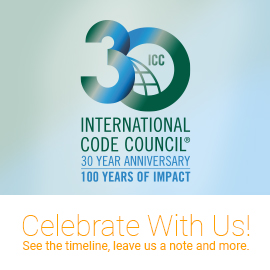
Scott Holm: Upholding the high standards of professionalism in the building safety community
International Code Council Professional Development Council member Scott Holm shares on upholding the high standards of professionalism in the building safety community

![]() Whether you are new to the construction profession, an experienced tradesperson or an accomplished code professional looking to enhance your knowledge, advance your career or earn certification, you need a variety of education and certification options to help you reach your professional goals. Dedicated to strengthening the credibility of the International Code Council’s certification and education programs, the Professional Development Council (PDC) advises the Board of Directors on coordinated career path resources for Code Council members. The Professional Development Council is comprised of the Education Committee — that provides strategic direction and facilitates the development and delivery of comprehensive code-related courses to help code officials, inspectors and design professionals elevate their qualifications, advance and grow in their profession — and the Certification Committee, which promotes the professionalism of individuals in the built environment by providing professional examinations and certification services worldwide.
Whether you are new to the construction profession, an experienced tradesperson or an accomplished code professional looking to enhance your knowledge, advance your career or earn certification, you need a variety of education and certification options to help you reach your professional goals. Dedicated to strengthening the credibility of the International Code Council’s certification and education programs, the Professional Development Council (PDC) advises the Board of Directors on coordinated career path resources for Code Council members. The Professional Development Council is comprised of the Education Committee — that provides strategic direction and facilitates the development and delivery of comprehensive code-related courses to help code officials, inspectors and design professionals elevate their qualifications, advance and grow in their profession — and the Certification Committee, which promotes the professionalism of individuals in the built environment by providing professional examinations and certification services worldwide.
It takes the time and expertise of many individuals working through the numerous Code Council committees to shape it into the world-class membership association that exists today. Volunteers, one of the most important assets of the Code Council, play a key role in the day-to-day work of the Professional Development Council and are integral to helping develop the certification and education avenues that help building safety professionals to be effective in U.S. and global communities.
In this exclusive feature for the Building Safety Journal, we asked Scott Holm to share their experience serving on the Code Council’s Professional Development Council, their professional career, and any insights or advice they have concerning the industry.
Scott Holm
Building and Structure Sciences Senior Consultant
Braun Intertec
Bloomington, Minnesota, United States
International Code Council member for 30-plus years
Association of Minnesota Building Officials
How long have you been in the industry?
Thirty-plus years.
What was the path to your career — how and why did you pursue a profession in building safety?
I see the building safety profession as an opportunity to educate and provide a safe living and working environment in our communities.
I began my construction career in vocational school majoring in carpentry. After school, I worked as a carpenter/concrete finisher in both commercial and residential construction. However, after years of long, tough, and unknown hours, a change was needed.
Fortunately, we had a long-time friend of the family who was the local building official. He mentored me through night school where I majored in building inspection technology and completed the Associate of Applied Science degree. This degree got my foot in the door as a building inspector with the city of Hugo Minnesota, then the city of Minnetonka Minnesota, and I completed my public service with the University of Minnesota. Currently, I work for Braun Intertec as a building and structure sciences senior consultant focusing on building codes, building enclosure, and building investigations and litigation. I also currently teach courses in the construction management programs at Dakota County Technical College, the University of Minnesota and Dunwoody College of Technology.
Throughout this path, higher education and training have played a vital role in my growth and career pursuit. Wanting to learn the how and why gave me a better understanding of the topic, whether it was construction, building safety or economics. This pursuit for continued life-long learning, and while working for the University of Minnesota, allowed me to pursue my Bachelor of Applied Science in construction management, and a master’s degree of education in business and industry education with a graduate certificate in career and technical education.
What major changes have you seen?
Two major changes I have seen in my building safety profession would be the code knowledge level of building contractors and the loss of the building inspection technology programs throughout the United States.
What excites you about the future of your industry?
The building safety industry is seeing more diversity and opportunities. This diversity includes more women building officials and we have inspectors/officials making the career move from the construction management, architecture and engineering worlds, which opens up the diversity of thought!
What do you see as most surprising about the work that you do?
As a building safety professional, I am surprised by the depth of knowledge one must have regarding the entire process. Not only are we experts on the building codes, but we are also involved with the design process to maintaining facilities, and must understand and assist the homeowner, design professionals, contractors, and facility managers to provide a safe built environment.
What led you to apply to become a member of the Professional Development Council?
I have had the pleasure of serving on many ICC committees starting with the CBO Exam Development Committee, then the Education Committee, Board of International Professional Standards (BIPS) Committee, and the Admin Code Development Committee. This committee service along with my higher education background allows me to share my passion for the safety professions and life-long learning.
What do you see as your role on the Professional Development Council/Education Committee/Certification Committee?
To advise the ICC Board of Directors on all education and training opportunities available for current members, and promote and grow these opportunities to the larger safety and built environment audiences.
Being a part of the Professional Development Council provides you with an overarching view of the education and certification offerings provided by the Code Council. With that knowledge, what would you recommend to individuals who are entering the industry?
Understand the difference between education and training. Education is the process of gaining knowledge and development from study, training is the process of acquiring the skills needed to perform a task.
For example, you may be able to quote code sections regarding chiller requirements, however, have no clue what a chiller is and how it functions in a building mechanical system.
What has been your most satisfying accomplishment with your work on the Professional Development Council?
Working with ICC staff and providing guidance for the Preferred Provider Program. The program opens up numerous educational and training opportunities for members to acquire the knowledge and skills necessary for their personal growth.
And finally, this last question is a fun one we ask for our Building Safety Journal readers. If you could have any superhero power, what power would you have and why?
Underwater adaption (Aquaman). My love for snorkeling and scuba diving!
Thank you for your work on the Professional Development Council. Your dedication to strengthening the Code Council’s certification and education programs is impressive and we appreciate your commitment to upholding the high standards of professionalism in the building safety community.
About the Professional Development Council
The Professional Development Council recommends initiatives identified by the Education Committee and the Certification Committee to better serve the needs of the membership, coordinates the goals and objectives of the Education Committee and the Certification Committee, and identifies certification and education issues arising from Code Council policies that will improve or enhance the position of the association.
The Education Committee is committed to providing strategic direction and facilitating the development and delivery of the most comprehensive portfolio of code-related courses available to meet the needs of code officials, inspectors and design professionals to elevate their qualifications as well as help them advance and grow in their profession. The Education Committee is responsible for advising Code Council staff and the Board of Directors on matters related to the ICC Education Program and the Learning Center, reviewing and selecting the topics and presenters for the annual business meeting, providing a review and recommendation for the Educator of the Year award, serving as a resource for review of potential learning initiatives and curriculums within the Learning Center, providing new topics and concepts for learning initiatives within the Learning Center, promoting and encouraging members to take advantage of the training offered by the Learning Center, and relaying information provided by the membership to staff in order to improve programs.
“The insight and guidance the Education Committee provides the Code Council is beyond measure,” said Tracy Lendi, vice president of Training & Education for the International Code Council. “While not only offering a myriad of educational ideas, the committee offers a safe place to discuss and debate these ideas so we can provide comprehensive and effective training solutions to the building industry. Being a part of the Educational Committee is truly my honor and privilege.”
The Certification Committee is dedicated to promoting the professionalism of individuals in the built environment by providing professional examinations and certification services worldwide. It has sole authority over the rules and procedures of the ICC Certification Program, including such topics as the renewals process, examination security policies and disciplinary action. The Certification Committee is responsible for advising Code Council staff and the Board of Directors on all matters related to the Certification Program, maintaining the International Registry of current ICC Certified professionals, supporting international recognition of ICC Certifications, direction and oversight of the Examination Development Committees, and serving as a disciplinary board.
“It is a privilege to work with the members of the Certification Committee,” said Autumn Saylor, director of the International Code Council’s Assessment Center. “The Code Council appreciates the committee’s commitment to upholding the high standards of professionalism in the building safety community.”
From an array of training options for every individual to the ICC Assessment Center, the Career Center, the signature Safety 2.0 initiative, or its Scholarship Program, the Code Council is committed to supporting the education and certification of existing and future code officials.





